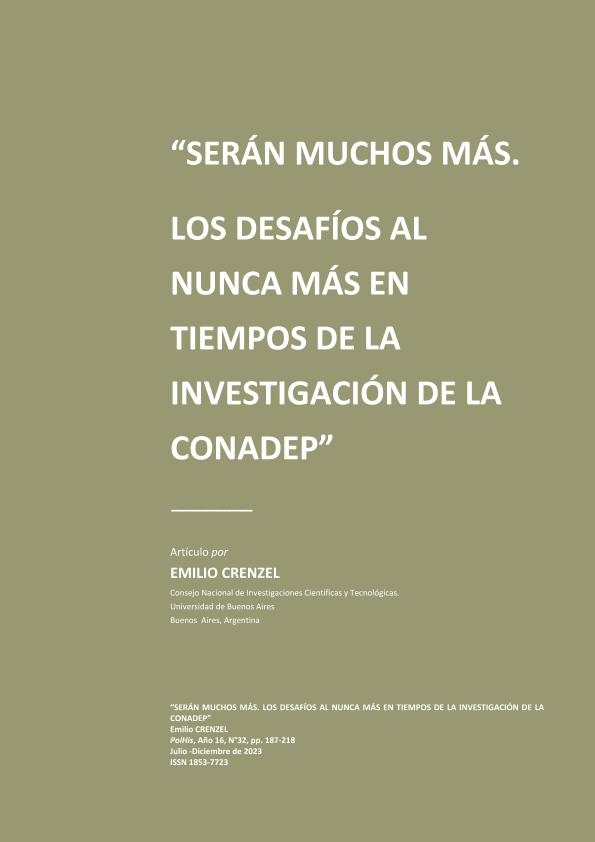Artículo
Recurrentemente, en el marco de la preocupación por la presencia de voces justificadoras, relativizadoras o negacionistas de los crímenes de Estado, se hace referencia a que, como novedad, desafían el Nunca Más, pacto fundante de la democracia iniciada el 10 de diciembre de 1983 que desechó el recurso a la violencia política. En este artículo, describiré y analizaré las manifestaciones –verbales y materiales- contrarias a la voluntad de investigación de los crímenes de Estado y a su no repetición, sostenidas por una variedad de actores durante la investigación de la Comisión Nacional sobre la Desaparición de Personas (CONADEP) creada para investigar el destino de los desaparecidos y elevar las pruebas recabadas a la justicia. Pondré de manifiesto la existencia de una variada gama de argumentos y prácticas que negaban, relativizaban o justificaban los crímenes y que prolongaban las interpretaciones esgrimidas por la dictadura ante las denuncias de las violaciones a los derechos humanos y que pueden pensarse como antecedentes de las desenvueltas por actores que las reproducen en la actualidad. El artículo procura historizar la justificación, negación y relativización de los crímenes de Estado inscribiendo a estas corrientes en una trayectoria que trasciende su presencia en la actual escena política. When discussing the issue of voices justifying, relativizing or denying state crimes, there is a tendency to refer to the Nunca Más challenge as a novelty. This report, considered the cornerstone of the democracy that emerged on 10 December 1983, represents a renunciation of the use of political violence. This article describes and analyses the manifestations - verbal and material - contrary to the will to investigate state crimes, and their nonrepetition, which have been raised by various actors during the investigation by the National Commission on the Disappearance of Persons (CONADEP), created to investigate the fate of the disappeared by bringing the evidence to justice. It will show the existence of a wide range of arguments and practices that denied, relativized or justified the crimes and prolonged the arguments put forward by the dictatorship in the face of allegations of human rights violations. It argues that they can be considered as antecedents to those developed by the actors that are being reproduced today. The article seeks to historicize the justification, denial and relativization of state crimes, inscribing these currents in trajectories that transcend their presence on the current political scene.
Serán muchos más: Los desafíos al Nunca Más en tiempos de la investigación de la CONADEP
Título:
There will be many more: challenges to the Nunca Más in times of the CONADEP investigation
Fecha de publicación:
12/2023
Editorial:
Universidad Nacional de Mar del Plata. Facultad de Humanidades. Programa Interuniversitario de Historia Política
Revista:
Polhis
ISSN:
1853-7723
Idioma:
Español
Tipo de recurso:
Artículo publicado
Clasificación temática:
Resumen
Palabras clave:
CONADEP
,
NUNCA MÁS
,
NEGACIONISMO
,
RELATIVIZACIÓN
Archivos asociados
Licencia
Identificadores
Colecciones
Articulos(SEDE CENTRAL)
Articulos de SEDE CENTRAL
Articulos de SEDE CENTRAL
Citación
Crenzel, Emilio Ariel; Serán muchos más: Los desafíos al Nunca Más en tiempos de la investigación de la CONADEP; Universidad Nacional de Mar del Plata. Facultad de Humanidades. Programa Interuniversitario de Historia Política; Polhis; 16; 32; 12-2023; 187-218
Compartir




